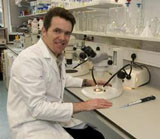50-year puzzle surrounding drug thalidomide unraveled: Study
 Recent study has revealed causes behind negative effects of drug thalidomide on unborn babies. Drug thalidomide was taken for morning sickness by pregnant women in the late 1950s and early 1960s. But it was withdrawn from market after several babies were born with missing or shortened limbs and other serious defects.
Recent study has revealed causes behind negative effects of drug thalidomide on unborn babies. Drug thalidomide was taken for morning sickness by pregnant women in the late 1950s and early 1960s. But it was withdrawn from market after several babies were born with missing or shortened limbs and other serious defects.
Recent study by an Aberdeen University team revealed that a component of the drug prevented the growth of new blood vessels in the developing embryo.
Lead researcher, Dr Neil Vargesson, a lecturer in developmental biology, said: "We have put to rest a 50-year puzzle, in finally deducing how thalidomide triggers limb defects and why it appears to target limbs preferentially."
"This is the first paper to conclusively show that it is the anti-angiogenic property of the drug - that element that inhibits new blood vessel formation - that is to blame for the defects. The drug prevented early blood vessels going into the limb."